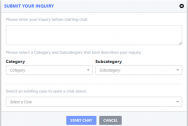The Importance of Service Level Agreements in Your HR Help Desk
Service Level Agreements (SLA) are the means for tracking and managing response times to resolve employee issues, measured against corporate commitment times (performance guarantees).
For instance, HR may guarantee a 24-hour (one day) response to a paycheck or harassment issue, but as many as 5 days to process a tuition reimbursement request. In many government regulated industries and unionized organizations, businesses may be required by law or contract to provide response guarantees, while other businesses may offer guarantees simply as a courtesy and for good will.
There is no better tool to manage SLAs than your HR Help Desk — assuming you have one. Administrators set up general (broad) case categories and specific subcategories within each category, then assign SLA periods to each subcategory. From there, the system takes over and automatically tracks SLA performance in detailed reports.
So far, so good. But, how robust is the Help Desk SLA configuration engine? Are your rules simple or complex? Do you measure SLA periods in hours or days? Do weekends count towards the SLA time? What about holidays or any other special days? Do they count? Are the rules different for different locations or employee classifications?
If admins get it wrong, there could be serious ramifications if a critical SLA (such as a harassment complaint) is not met. Get it right and employee relations greatly improve and policies are consistently adhered to.
Just as important as setting the correct policies is the 24/7/365 monitoring of actual results. What is the point of having strict SLA rules when they aren’t met with regularity? LBi HR Help Desk notifies case owners and their manager when an SLA is close to being overdue, and again if the case is in fact is late. The case screen also highlights in red letters and displays in a pie chart when it is overdue.
SLA reports in LBi HR Help Desk provide everything from specific case details in missed SLAs all the way down to broad summaries by company division, case category, case owner, etc. These reports provide the essential tools for deep analysis of SLA adherence issues, so HR can address problems before they hit critical mass. LBi HR Help Desk also provides non-technical users the ability to extract any data points from any report into external reporting and analytical applications like Excel pivot tables, Crystal Reports, SQL Server Reporting tool, Business Objects and more.
Successful SLA performance begins with setting achievable goals. Some SLAs may be mandatory depending on your business, while others may be more open-ended. LBi HR consultants have a depth of HR experience in all major Industries. We work closely with our clients to ensure they are meeting and exceeding industry standards and norms. Many of LBi’s clients are government regulated, so our team of experts can provide valuable insights when planning and setting up SLA rules in LBi HR Help Desk.







